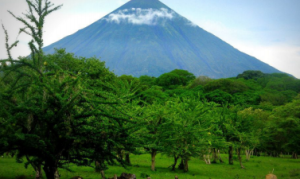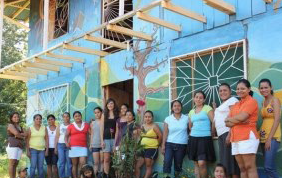by Noelle London
Fall 2013 InGear
Last year as I sat at the high school graduation in the rural community of Balgüe, Nicaragua, I counted that a third of the girls in my class were either pregnant at the time or already had a child. I know I am failing to count a few as I was unaware they were mothers and that many other girls failed to make it to graduation day, dropping out previously due to teen pregnancy. Aside from this obvious problem, many other young Nicaraguan women choose to drop out of high school due to the pressure to provide for family needs within the household. Many may feel a need to be at home to complete daily chores like patting tortillas and cooking beans, looking after the men’s needs in the household, or caring for young children. While many urban communities may see a different situation, this is still the reality of a Nicaraguan woman in a rural community.

You see, this takes place on Ometepe, an idyllic island where at any point you look up to find two looming volcanoes within a freshwater lake. It’s considered the pearl of Nicaragua. Mark Twain has been known to write of it and a couple years ago it was shortlisted for the seven great wonders of the world. It is essentially a little slice of paradise. But, on the other hand, this paradise falls short of providing many opportunities for youth to plan their futures. Employment opportunities that allow islanders to stay on the island are hard to come by.
With the brightest students, you often see that a “brain drain” syndrome is ever present. Usually if youth come from families with resources they will study in the university in the capital, pick a career that makes it hard to find work on the island, and are forced to stay in the capital to find employment. I was proud to see many of my last year’s high school seniors go on to study advanced careers, but the reality is—how many dentists do you need on a rural island when dental care is still viewed as a luxury? For those that do not or cannot choose higher education, employment is still a challenge. Last year when I asked a young woman what she would do following high school, she told me that she would most likely emigrate to Costa Rica to find work. Many feel that more opportunities lie abroad than in Nicaragua.
Hopefully, as the economy shifts from agriculture to tourism, the diversity will bring more opportunity and islanders will realize the necessity to focus on the training of trades. With tourism, there is a need for some push from government and educational institutions for programs like business education and English training. With sustainable employment opportunities, more islanders will be able to stay closer to home while also allowing tourism to develop in a sustainable manner where the benefit is felt in more island communities.

A recent donation of six sewing machines by Pedals for Progress has helped to improve the lives of one particular group of women, Girasol Sewing Cooperative. (A girasol is a sunflower in Spanish). This sewing cooperative on the Island of Ometepe was started to provide an opportunity to learn the trade of sewing to improve their personal economic situation as well as that of their families and community. Sewing provides an income-generating activity for the women of the community of Balgüe, where employment opportunities for women are virtually non-existent.
Creating a self-sustaining sewing cooperative on an island can be difficult, as resources like sewing machines and materials still have to be imported by boat. This in turn drives up the prices of basic goods like school uniforms. However, what is beautiful about the Nicaraguan entrepreneurial spirit is that these women can view opportunities when many others view challenges. For Girasol, these challenges bring opportunities as tourism grows, and there is opportunity to break into a market where the majority of souvenirs come from the off-island departments of Masaya or Granada.
In March of 2012, these women were sitting in a classroom as we reviewed what a basic fraction and decimal were, as none of them were able to finish high school due to circumstances beyond their control. At the same time, the women participated in sewing classes led by the designer Kim Farrugia and began laying the foundation for their very own sewing workshop. Currently, in a little over a year, they have begun selling in multiple locations on the island and preparing their first international orders.
Pedals for Progress has continued to lend a helping hand promoting economic development in Nicaragua as well as many other countries around the world. It is notable what a couple hundred cordobas extra a month can do for a women. However, less talked about and equally important is the role of this cooperative in the personal lives of these women. The majority of these women are single mothers and have also never had the opportunity in their lives to earn a peso for themselves. Many still have to ask permission from their spouses to buy basic household necessities like toilet paper. With learning the trade of sewing, these women are allowed to see the potential of their own two hands, develop their creativity in a society that does not always nourish it, and understand the pride that comes from being able to contribute a small income to their families.
With P4P’s donation, the current cooperative will be able to formalize. More importantly, these sunflowers will be able to grow. With the new machines, there are plans to hold a new sewing course and to allow new women to be incorporated into the group as it expands. This means more women within the community are given a reason to get out of the house to go to triweekly meetings reminding them that they are strong, creative, and smart women. This is women’s empowerment, and it would not have been possible without the help of P4P.
Pedals for Progress has improved the quality of life for many Nicaraguans in the department of Rivas, with currently over 22,500 bicycles donated. In addition, P4P’s new partnership with Girasol Sewing Cooperative and donation of sewing machines has helped to lay a foundation for sustainable economic development on the island of Ometepe. Girasol’s transition from a project to a sustainable, independent business would have been difficult without the help of David Schweidenback, his team, and the contributions from Pedals for Progress’s supporters.
Noelle London
Peace Corps Nicaragua
Small Business Development 56
London.noelle@gmail.com
